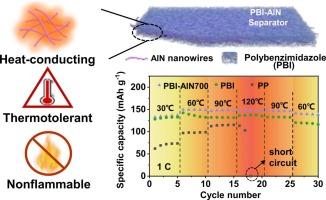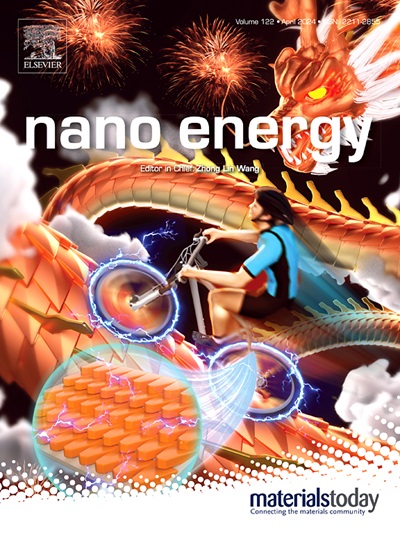A Thermally Managed Separator for Lithium Metal Batteries Operating Safely above 100 °C
IF 16.8
1区 材料科学
Q1 CHEMISTRY, PHYSICAL
引用次数: 0
Abstract
Safety is an essential concern in the ongoing pursuit of high-energy-density batteries. As one of the most promising energy storage systems, lithium metal batteries (LMBs) are still plagued by the dendrite growth and associated high risk especially in high-temperature environments. Herein, we have designed a thermally managed separator by hybridizing polybenzimidazole (PBI) with AlN nanowires (PBI-AlN), which shows the merits of heat resistance, nonflammability, and enhanced thermal conductivity. This design promotes dendrite-free plating and ensures the safe operation of LMBs over 100 °C. At room temperature, the Li|Li symmetric cell with the optimal PBI-AlN700 separator presents an ultralong lifetime over 10000 h with an ultralow overpotential of ≈16 mV at 5 mA cm−2 with 5 mAh cm−2. At the high temperature of 120 °C, the Li|LiFePO4 coin cell with PBI-AlN700 separator still has a large specific capacity of 148.9 mAh g−1 at 1 C. The corresponding pouch cell can steadily light the lamp arrays under repeated bending/restoring states and work safely over 100 ℃, showing the flexibility and high-temperature stability of the PBI-AlN separator. This study provides a novel separator to enable the safe operation of LMBs at high temperatures and proposes a strategy for separator design from a thermal management perspective.

用于金属锂电池的热管理分离器,可在 100 °C 以上安全运行
在不断追求高能量密度电池的过程中,安全性是一个至关重要的问题。作为最有前途的储能系统之一,锂金属电池(LMB)仍然受到枝晶生长和相关高风险的困扰,尤其是在高温环境下。在此,我们通过将聚苯并咪唑(PBI)与 AlN 纳米线(PBI-AlN)杂交,设计出了一种热管理隔膜,它具有耐热性、不可燃性和增强的导热性等优点。这种设计促进了无树枝状晶粒的电镀,确保了 LMB 在 100 ℃ 以上的安全运行。在室温条件下,采用最佳 PBI-AlN700 分离器的锂-锂对称电池具有超过 10000 小时的超长寿命,在 5 mA cm-2 和 5 mAh cm-2 条件下,过电位≈16 mV。在 120 ℃ 的高温条件下,采用 PBI-AlN700 隔离层的磷酸铁锂纽扣电池在 1 C 时仍具有 148.9 mAh g-1 的大比容量。相应的袋式电池在反复弯曲/恢复状态下仍能稳定地点亮灯阵,并在 100 ℃ 以上安全工作,显示了 PBI-AlN 隔离层的灵活性和高温稳定性。这项研究提供了一种新型分离器,使 LMB 能够在高温下安全运行,并从热管理的角度提出了分离器的设计策略。
本文章由计算机程序翻译,如有差异,请以英文原文为准。
求助全文
约1分钟内获得全文
求助全文
来源期刊

Nano Energy
CHEMISTRY, PHYSICAL-NANOSCIENCE & NANOTECHNOLOGY
CiteScore
30.30
自引率
7.40%
发文量
1207
审稿时长
23 days
期刊介绍:
Nano Energy is a multidisciplinary, rapid-publication forum of original peer-reviewed contributions on the science and engineering of nanomaterials and nanodevices used in all forms of energy harvesting, conversion, storage, utilization and policy. Through its mixture of articles, reviews, communications, research news, and information on key developments, Nano Energy provides a comprehensive coverage of this exciting and dynamic field which joins nanoscience and nanotechnology with energy science. The journal is relevant to all those who are interested in nanomaterials solutions to the energy problem.
Nano Energy publishes original experimental and theoretical research on all aspects of energy-related research which utilizes nanomaterials and nanotechnology. Manuscripts of four types are considered: review articles which inform readers of the latest research and advances in energy science; rapid communications which feature exciting research breakthroughs in the field; full-length articles which report comprehensive research developments; and news and opinions which comment on topical issues or express views on the developments in related fields.
 求助内容:
求助内容: 应助结果提醒方式:
应助结果提醒方式:


